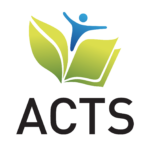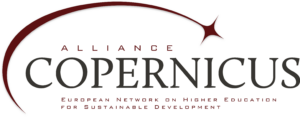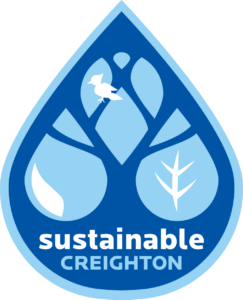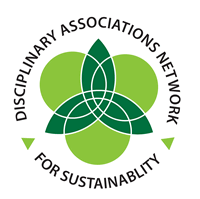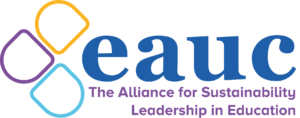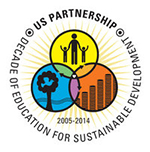
- This event has passed.
Sustainability Education Forum 2023
June 8, 2023 - June 9, 2023
This workshop has passed. You can purchase a copy of the recording and resource materials.
Calling all change-makers, forward thinkers and progressive educators! 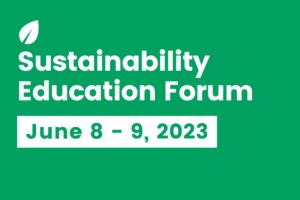 Let’s come together, share our expertise and co-create our emerging future. After years of global disruption, what are the challenges and opportunities for sustainability education as we progress in a post-pandemic world? What and how do we teach students given the urgency of the times? How do we “fall-forward” on issues related to sustainability teaching and learning in higher education? It is time for us to share, listen and speak about the issues that matter to interdisciplinary sustainability educators.
Let’s come together, share our expertise and co-create our emerging future. After years of global disruption, what are the challenges and opportunities for sustainability education as we progress in a post-pandemic world? What and how do we teach students given the urgency of the times? How do we “fall-forward” on issues related to sustainability teaching and learning in higher education? It is time for us to share, listen and speak about the issues that matter to interdisciplinary sustainability educators.
Are higher education institutions simply reverting to how things were done pre-pandemic or can we use this opportunity to truly redesign systems? Visions for the future – what’s possible and what needs to be done – have adjusted and are recalibrating. New and different voices need to be heard and conversations need to catalyze actionable change. On June 8 and 9, let’s talk with each other, think with each other and respectfully challenge each other’s ideas in order to advance sustainability education across the curriculum.
The Sustainability Education Forum (SEF) will provide space to explore these possibilities and more. Per the Merriam-Webster dictionary, a forum is “a public meeting place for open discussion” and this is what the SEF offers – a space for authentic conversations, where we can engage as a community and with each other. Throughout the SEF, you will have plenty of chances to exchange ideas and make new professional connections, while gaining inspiration and an opportunity to recharge your own efforts. See what topics registered attendees would like to discuss at the event.
Intended Audience
This is the event to attend if you’re:
- a faculty in any discipline who is engaged with sustainability education
- interested in or just starting incorporating sustainability literacy in your courses
- considering building a sustainability curriculum development program at your institution
- new or a veteran at building sustainability across the curriculum programs
- involved with sustainability-degree programs
- a sustainability staff who is involved with curriculum initiatives
- an instructional designer supporting faculty incorporating sustainability in their courses
- anyone interested in sustainability education and research at higher education institutions.
Key Details
Event Dates: The SEF will take place on Thursday, June 8 and Friday, June 9 spanning multiple timezones. See Tentative Schedule.
Registration Fees*
| Registration Type | Registration Fee |
| Individual associated with an AASHE member organization* | $125 |
| Individual not associated with an AASHE member organization | $175 |
| Groups | Full price for first registrant and 20% off for each subsequent registrant |
* To check if your organization is a current AASHE member, please search the AASHE Membership Directory.
Discounts are available for group registration. A limited number of scholarships are available to individuals who need financial assistance to participate. Please apply by June 6 to be considered for a scholarship for this event.
Registration Policies:
- Payment is accepted in the form of Visa, MasterCard, American Express and Discover cards.
If you need to pay by check or ACH, please contact us at least 5 weeks prior to the event start date. Registration using these forms of payment must be received 4 weeks prior to the event start date and full payment must be received by AASHE within 2 weeks of event start date. - Cancellation Policy: A 20% processing fee applies to any cancellation prior to May 29, 2023. No refunds will be given after May 29, 2023.
- No substitutions are allowed.
- Registered participants will receive access to the recorded portions after the live event.
- Review all Terms & Conditions.
Tentative Schedule (listed in EDT) – see schedule in other time zones
Day 1Block 1: 9:45 a.m – 1:30 p.m. EDT Block 2: 2 p.m. – 5:30 p.m. EDT Block 3: 7 p.m. – 10:30 p.m. EDT |
Day 2Block 4: 10 a.m – 1:30 p.m. EDT
Block 5: 2 p.m. – 5:30 p.m. EDT
|
Invitations
These thought-provoking sessions are intended to encourage discussion, challenge conventional wisdom, and stimulate new ideas, thoughts and actions.
Invitation #1: Bryan Alexander, “Universities on Fire: Higher Education in the Age of Climate Crisis”
An exploration of how climate change will fundamentally reshape higher education.
In the opening session of the SEF, Bryan Alexander, higher education futurist, offers his forecast for the rest of the century. In this highly engaging session and discussion, we’ll examine the two core missions of colleges and universities, research and teaching, and how both of those might expand as they grapple with the emergent climate crisis. We’ll also explore academic-community relations, including how a campus can engage its local community on climate issues and how academics can seek to influence the global transformation. We conclude by exploring how some institutions might decide not to engage with global warming, yet find themselves forced to in the future by many climate-change related events.
Bryan Alexander, Senior Scholar, Georgetown University (Read full bio)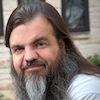 Bryan Alexander is an award–winning, internationally known futurist, researcher, writer, speaker, consultant, and teacher, working in the field of higher education’s future. In 2013 Bryan launched Bryan Alexander Consulting, LLC. Through BAC he helps colleges, universities, libraries, museums, government agencies, businesses, nonprofits, and other organizations look ahead to the future in an era of rapid and challenging transformation. Bryan also leads the Futures Trends Forum – a weekly open yet curated space for exploring the future of higher education. Bryan Alexander is an award–winning, internationally known futurist, researcher, writer, speaker, consultant, and teacher, working in the field of higher education’s future. In 2013 Bryan launched Bryan Alexander Consulting, LLC. Through BAC he helps colleges, universities, libraries, museums, government agencies, businesses, nonprofits, and other organizations look ahead to the future in an era of rapid and challenging transformation. Bryan also leads the Futures Trends Forum – a weekly open yet curated space for exploring the future of higher education.In March 2023 he published Universities on Fire: Higher Education in the Age of Climate Crisis for Johns Hopkins University Press. His previous book, Academia Next: The Futures of Higher Education won the 2020 Association of Professional Futurists Most Significant Futures Works award for analyzing a significant future issue and was named one of Forbes’ Best Higher Education Books Of 2020. |
Invitation #2: Tatiana Height, “The Ghosts of Environmental Justice Past, Present, and Future”
In this session we will examine the history of environmental injustice, situate that history alongside past and present medical racism, and explore Afrofuturistic approaches to dismantling ongoing environmental injustices.
Tatiana Height, Lecturer – Sustainability and Coastal Resilience, Coastal Carolina University (Read full bio)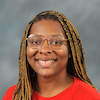 Tatiana Height is a hood feminist, scholar-activist, and Lecturer of Sustainability and Coastal Resilience in the HTC Honors College at Coastal Carolina University. Their research interests pertain to environmental justice, environmental education, and community development. In particular, Dr. Height is interested in examining strategies to create more equity and justice-centered environmental education programs. Further, as a scholar-activist, Dr. Height engages in research and practice on leveraging equity pedagogies to develop the next generation of environmental leaders in underserved and urban communities. Dr. Height’s prior publications include a first-author peer-reviewed paper entitled The 2020 Social and Environmental Apocalypse: Reimagining Black America, published in a special issue of the American Studies journal that centered on Afrofuturism and the environment. Currently, Dr. Height is a part of a writing team to produce a pay equity guide for environmental education organizations in the U.S. South. Tatiana Height is a hood feminist, scholar-activist, and Lecturer of Sustainability and Coastal Resilience in the HTC Honors College at Coastal Carolina University. Their research interests pertain to environmental justice, environmental education, and community development. In particular, Dr. Height is interested in examining strategies to create more equity and justice-centered environmental education programs. Further, as a scholar-activist, Dr. Height engages in research and practice on leveraging equity pedagogies to develop the next generation of environmental leaders in underserved and urban communities. Dr. Height’s prior publications include a first-author peer-reviewed paper entitled The 2020 Social and Environmental Apocalypse: Reimagining Black America, published in a special issue of the American Studies journal that centered on Afrofuturism and the environment. Currently, Dr. Height is a part of a writing team to produce a pay equity guide for environmental education organizations in the U.S. South. |
Invitation #3: Annette Bos, “Exploring Educators’ Perspectives of Teaching Social and Emotional Competencies for Climate Change”
Sustainable development encounters numerous challenges characterized by volatility, uncertainty, complexity, and ambiguity, often referred to as VUCA. Students aiming for careers in sustainable development need to cultivate the capacity to effectively navigate and respond to these VUCA conditions. In order to do so, students need to develop social and emotional competencies that can help to prepare for, understand, and adapt to VUCA situations. Little is known if, and how, such skills are taught and/or developed in higher education programs.
This session will unpack educator attitudes towards: i) VUCA conditions that are associated with the challenges of the 21st century, as well as ii) the teaching of social and emotional competencies to students engaged in sustainable development learning. The following discussion will also offer some insights into how higher education institutions can create an enabling environment for such learning and skill development to happen.
Annette Bos, Associate Professor, Sustainable Development Education, Monash University, Australia (Read full bio)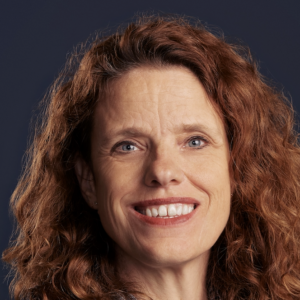 Annette Bos is Deputy Director (Education) at Monash Sustainable Development Institute (MSDI) in Melbourne, Australia – one of the leading interdisciplinary research and education institutes for sustainable development that is driven to find real solutions to some of the most significant challenges facing our world today.Annette has interests in developing the capacity of individuals and organisations to collaborate, influence and lead innovative responses to complex, inter-connected sustainable development challenges. She works to provide a range of diverse transformative educational experiences to equip people and organisations to be change-makers, locally and globally. Annette Bos is Deputy Director (Education) at Monash Sustainable Development Institute (MSDI) in Melbourne, Australia – one of the leading interdisciplinary research and education institutes for sustainable development that is driven to find real solutions to some of the most significant challenges facing our world today.Annette has interests in developing the capacity of individuals and organisations to collaborate, influence and lead innovative responses to complex, inter-connected sustainable development challenges. She works to provide a range of diverse transformative educational experiences to equip people and organisations to be change-makers, locally and globally.Prior to joining Monash University, Annette was involved in capacity development and consultancy related to water services management in Europe as well as Africa. Throughout her career, she has worked extensively with industry, government agencies and aid organisations. |
Invitation #4: Michelle M. Jacob (Yakama), “Indigenous Teachings & Sustainability Education”
Shix páchway! I invite you to attend my session at the Sustainability Education Forum to honor the timeless Indigenous tradition of gathering, considering root causes of the problems our collectives are facing, and to share stories, ideas, and connections to support our bringing into being a generative pathway forward. If this sounds like a helpful approach to you, please join us on Friday morning! It is a special day, June 9; it is the day many peoples, including citizens of the Yakama Nation, commemorate the signing of the Treaty of 1855 with the United States. In my session, I will discuss why knowing the histories of the lands upon which we live, work, an learn is so important for anyone who seeks to enact justice. In all the work I do, I am grateful to affirm Yakama cultural teachings are nurturing and sustaining; Indigenous teachings provide us with deep understandings and insight into ethics of care and responsibility, which should be at the foundation of all our work in sustainability education.
Michelle M. Jacob, Professor of Indigenous Studies, University of Oregon (Read full bio)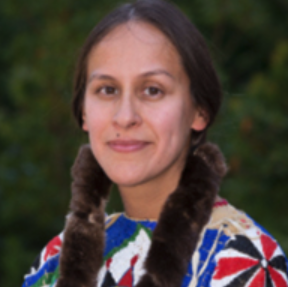 Michelle M. Jacob is an enrolled member of the Yakama Nation and is Professor of Indigenous Studies and Director of the Sapsik’ʷałá (Teacher) Education Program in the Department of Education Studies at the University of Oregon. Michelle also serves as Affiliated Faculty in the Department of Indigenous, Race, and Ethnic Studies, and Affiliated Faculty in the Environmental Studies Program. Michelle engages in scholarly and activist work that seeks to understand and work toward a holistic sense of health and well-being within Indigenous communities and among allies who wish to engage decolonization. Her research areas of interest include: Indigenous methodologies, spirituality, health, education, Indigenous feminisms, and decolonization. One of Michelle’s greatest joys is camping around the many beautiful places across the Columbia River basin. Michelle M. Jacob is an enrolled member of the Yakama Nation and is Professor of Indigenous Studies and Director of the Sapsik’ʷałá (Teacher) Education Program in the Department of Education Studies at the University of Oregon. Michelle also serves as Affiliated Faculty in the Department of Indigenous, Race, and Ethnic Studies, and Affiliated Faculty in the Environmental Studies Program. Michelle engages in scholarly and activist work that seeks to understand and work toward a holistic sense of health and well-being within Indigenous communities and among allies who wish to engage decolonization. Her research areas of interest include: Indigenous methodologies, spirituality, health, education, Indigenous feminisms, and decolonization. One of Michelle’s greatest joys is camping around the many beautiful places across the Columbia River basin.Michelle’s first two books, Yakama Rising: Indigenous Cultural Revitalization, Activism, and Healing, and, Indian Pilgrims: Indigenous Journeys of Activism and Healing with Saint Kateri Tekakwitha, were published by the University of Arizona Press. Dr. Jacob’s third book, On Indian Ground: A Return to Indigenous Knowledge-Generating Hope, Leadership and Sovereignty through Education in the Northwest, was co-edited with Stephany RunningHawk Johnson, and published by Information Age Publishing. Michelle’s latest books, The Auntie Way: Stories Celebrating Kindness, Fierceness, and Creativity, and Huckleberries and Coyotes: Lessons from Our More than Human Relations, were published by Anahuy Mentoring. See all of Michelle’s books and articles. |
Invitation #5: Krista Hiser & Matt Lynch, “The A Word for Sustainability”
An invitation to consider accreditation for sustainability degree programs in higher education.
The Global Council for Science and the Environment (GCSE) is exploring the idea of programmatic accreditation for sustainability programs. The question of scope and scale has led Krista Hiser, who leads the project as Senior Advisor for Sustainability Education at GCSE, into the history, design, and recent proliferation of sustainability degrees with all their strengths and weaknesses. Fly to the 30,000 foot view of higher education in this one-act improv play session and think about pros and cons of accreditation for sustainability.
Krista Hiser, Senior Lead and Advisor, GCSE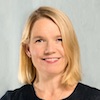 Krista is the Senior Lead and Advisor at GCSE for advancing Sustainability Education and the Key Competencies Framework. In her role she works with partners at Arizona State University, and GCSE’s Sustainability Education Community of Practice, as well as stakeholders across higher education. She has been Senior Fellow for Community Colleges at GCSE since 2018. Formerly the director of the University of Hawaiʻi System Center for Sustainability Across the Curriculum, she is on professional leave from Kapiʻolani Community College, where she is a Professor of Composition & Rhetoric with an emphasis on sustainability curriculum, climate change education, and community resilience. Krista is the Senior Lead and Advisor at GCSE for advancing Sustainability Education and the Key Competencies Framework. In her role she works with partners at Arizona State University, and GCSE’s Sustainability Education Community of Practice, as well as stakeholders across higher education. She has been Senior Fellow for Community Colleges at GCSE since 2018. Formerly the director of the University of Hawaiʻi System Center for Sustainability Across the Curriculum, she is on professional leave from Kapiʻolani Community College, where she is a Professor of Composition & Rhetoric with an emphasis on sustainability curriculum, climate change education, and community resilience.Additionally, Krista facilitates the AASHE “Ultimate Cli-Fi Book Club for Sustainability in Higher Education”, authors the blog, “Ultimate Cli Fi Book Club” and has been an obsessive reader of post-apocalyptic and climate themed fiction for many years. Matthew Kamakani Lynch, Artist & Polymath 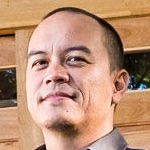 Matt is an Artist & Polymath who has consistently worked his way to the top tier of performance in the varied sectors where we has participated: banking, community development, higher education, public service, and the arts. Matt has now dedicated his life towards creating conditions to catalyze cultural healing and transformation. He currently serves as a teaching faculty member on Harvard’s Executive Education for Sustainability Leadership program, and is helping communities on the island of Molokai to buy back the 65k-acre Molokai Ranch from its foreign owners. Matt is an Artist & Polymath who has consistently worked his way to the top tier of performance in the varied sectors where we has participated: banking, community development, higher education, public service, and the arts. Matt has now dedicated his life towards creating conditions to catalyze cultural healing and transformation. He currently serves as a teaching faculty member on Harvard’s Executive Education for Sustainability Leadership program, and is helping communities on the island of Molokai to buy back the 65k-acre Molokai Ranch from its foreign owners. |
How It Will Work
SEF is designed to be participatory, inclusive and collaborative and is based on an Open Space Technology (OST) format. You are invited to speak and share, pose questions and/or ask for input with the ultimate aim of refining and progressing your sustainability education approach. Guidelines will be provided to make best use of our time together and to maximize capacities for partnerships and exchange.
In addition to several pre-scheduled sessions that we call Invitations, you – the participant – get to propose the topics that will be discussed and then set the agenda for discussion. The agenda will be created live each day by attendees who are present. Anyone who wants to host a session will announce the topic and choose a space and time and be assigned a session room. You and the other participants choose which discussions to attend.
Share This Event
When we bring all voices and perspectives into the room, we create the conditions for powerful change. Invite your colleagues to join you at this event by using these sample messages!
Any questions about the event?
Please contact Daita Serghi, education@aashe.org.
Register Today Browse More Professional Learning Programs
Thank you to our Promotional Partners for your support!
Would your organization like to help promote this event? Become a Promotional Partner! One free registration included!
